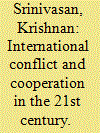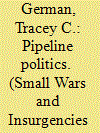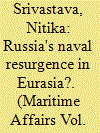|
|
|
Sort Order |
|
|
|
Items / Page
|
|
|
|
|
|
|
| Srl | Item |
| 1 |
ID:
108711


|
|
|
|
|
| Publication |
2011.
|
| Summary/Abstract |
Since the end of the Cold War, India's strategic horizons have moved beyond its traditional preoccupations in South Asia. India is developing a strategic role in East Asia in particular. At the same time India's strategic thinking has undergone a revolution, as the country that prided itself on non-alignment has moved closer to the West. But India's culture, history and geography still fundamentally shape its worldview. In engaging with East Asia, India is guided by a mosaic of strategic objectives about extending its sphere of influence, developing a multipolar regional system and balancing against China. The interplay of these objectives will frame India's role in East Asia in coming years.
|
|
|
|
|
|
|
|
|
|
|
|
|
|
|
|
| 2 |
ID:
085953


|
|
|
|
|
| Publication |
2009.
|
| Summary/Abstract |
The rise of modern institutional multilateralism is a phenomenon dating back less than a hundred years, and there is no reason to infer that it is either immutable or permanent. With the end of the Cold War, there was an expectation of global consensus and the implementation of collective security. But this depended to an excessive extent on the United States and its willingness to use force, and the level of subjectivity in US-led interventions gave rise to questions of whether multilateralism could survive in conditions of unipolarity. Now the primacy of the United States is slipping, and its pre-eminence will decline as manufacturing, technology and innovation spread. From being the major lending country, it has become the biggest debtor. Despite American military superiority, the world will be increasingly poly-centric and the new emerging powers will exert a strong and increasing influence in world affairs. The character of international cooperation in the next few decades will be shaped by a process by which about half a dozen new major powers seek to mould regional orders of their own. A return to something akin to the 19th-century Concert of Powers seems possible, but this time on a global scale, and with the participation of the emerging strong nations in formal and informal governance structures. The United Nations will continue as a symbol of state sovereignty, and its remit in humanitarian, cultural and developmental good works will be unchallenged, but peace and security decisions at the regional level will be taken by the regional powers on the basis of their self-interest and without reference to the United Nations. Notwithstanding the reasons for the future world order, the existing foundations of security management will not be replaced by anything more reliable, just or legitimate.
|
|
|
|
|
|
|
|
|
|
|
|
|
|
|
|
| 3 |
ID:
089332


|
|
|
|
|
| Publication |
2009.
|
| Summary/Abstract |
The development of new energy export infrastructure, which bypasses Russia, has constituted a fundamental element of US and European engagement with the Caucasus in recent years, but has, to some extent, undermined Moscow's hegemony in an area that it considers to be its own 'strategic backyard'. This article examines the validity of the argument that Russian military intervention in Georgia in August 2008 was motivated by so-called 'petro-politics' and a desire to punish Tbilisi for its overt pro-Western orientation. It analyses the significance of the pipelines that transit Georgia and their implications for European energy security, together with the potential consequences of the 2008 conflict for future infrastructure developments.
|
|
|
|
|
|
|
|
|
|
|
|
|
|
|
|
| 4 |
ID:
150589


|
|
|
|
|
| Summary/Abstract |
Russia is a leading actor seeking regional influence in Eurasia. Among many aspects of its re-emerging profile, the Russian navy's pre-eminence in the region is noteworthy. Immediately after the disintegration of the USSR, a lack of funding dealt a blow to the Russian navy. However, with the aim of restoring Russian naval power, President Putin began to modernise the Russian navy. Therefore, after setting the backdrop and the strategic outlook of Russia, the study first examines the drivers behind Russia's quest for resurgence and goes on to analyse the trends and intentions of the Russian navy, especially in the four seas of Eurasia – namely the Black Sea, Baltic Sea, Mediterranean Sea and Caspian Sea. The paper also attempts to compare the Russian navy's strength with that of the erstwhile Soviet navy. The study concludes that in order to attain the erstwhile Soviet Union's naval power, Russia would need to overcome a major economic crisis as well as geopolitical challenges.
|
|
|
|
|
|
|
|
|
|
|
|
|
|
|
|
|
|
|
|
|